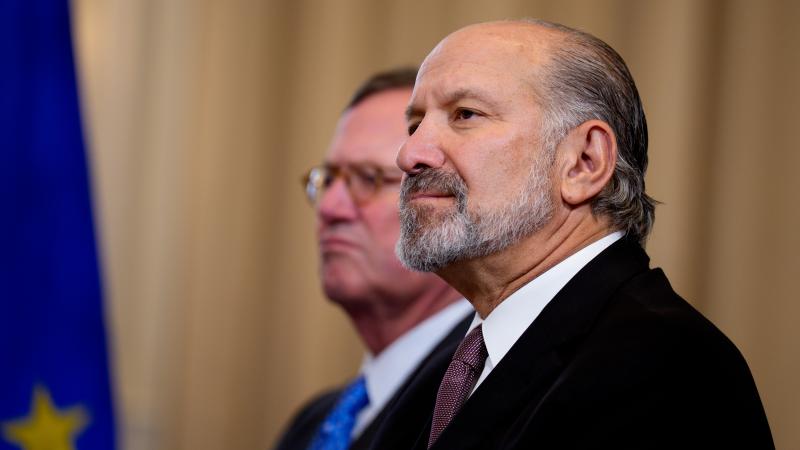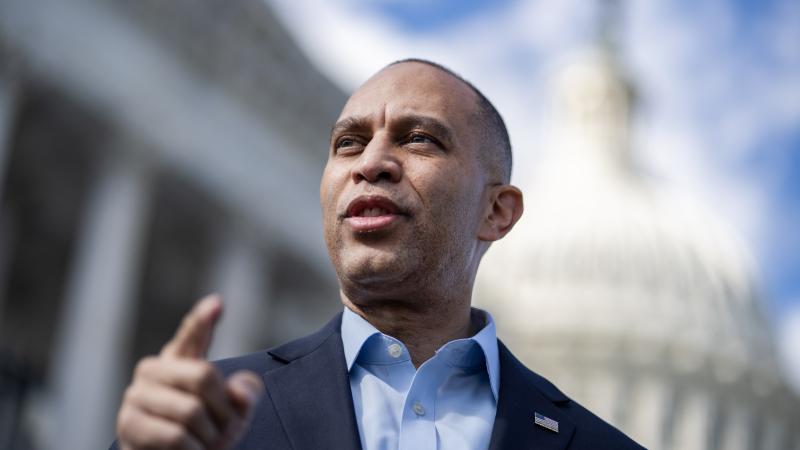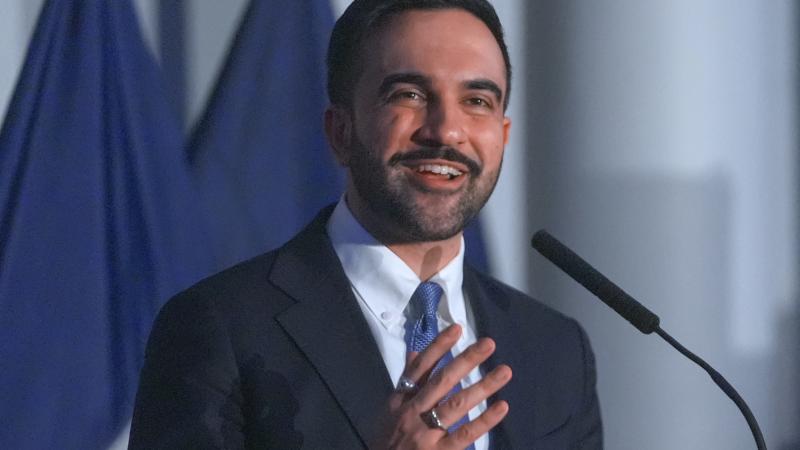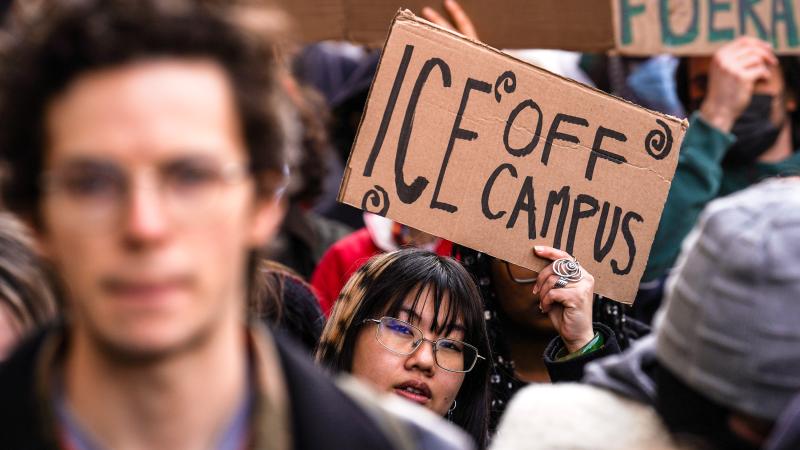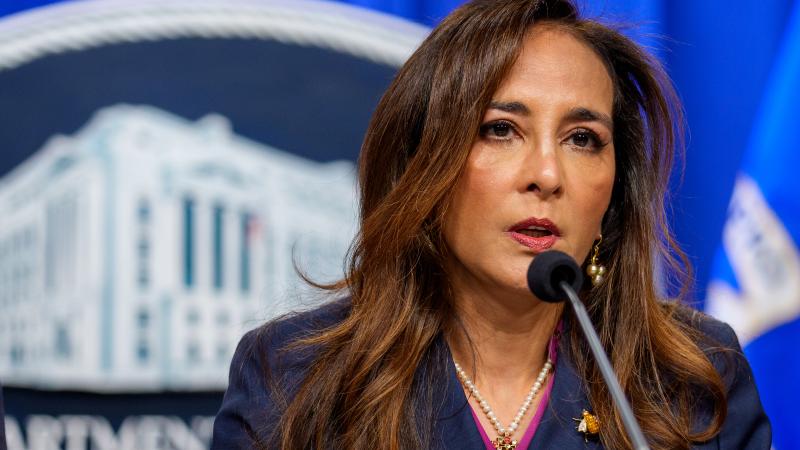No whites need apply: Pfizer offers minorities-only fellowship as firms embrace racial preference
"More and more American corporations seem to believe that civil rights laws don't apply to them," said legal expert Gail Heriot.
As U.S. corporations increasingly prioritize "diversity, equity and inclusion" — adopting racial and ethnic preferences in hiring, lending, and training opportunities to equalize outcomes, for example — legal experts are warning that these companies could be violating both civil rights laws and fiduciary responsibilities to their shareholders.
One such corporation coming under fire is pharmaceutical giant Pfizer, which created a prestigious fellowship that explicitly excludes whites and Asians from applying.
The "Breakthrough Fellow Program," which Pfizer describes as a "bold move" to "create a workplace for all," offers college students multiple internships, a fully funded graduate program, and years of employment at the company. However, only Black/African American, Latino/Hispanic, and Native American" students can apply, according to the fellowship's requirements.
The Frequently Asked Questions section of the program describes Pfizer as an "equal opportunity employer."
Legal experts expressed concern to Just the News that Pfizer's program is not only illegal but also part of a growing trend of corporations discriminating against white and Asian people in the name of diversity.
"More and more American corporations seem to believe that civil rights laws don't apply to them," said Gail Heriot, a law professor at the University of San Diego who also sits on the U.S. Commission on Civil Rights. "It's an alarming trend. They apparently believe that they can discriminate against Asian Americans and whites without fear of liability. They are going to find out that law doesn't work that way."
Pfizer didn't respond to a request for comment. However, Pfizer said in a 2021 report that it seeks to "embed DEI [diversity, equity, and inclusion] into our DNA," and CEO Albert Bourla in 2020 made "equity" one of the company's "core values."
"We don't just talk about the importance of equity," Bourla said at the time. "We put our words into action."
Pfizer is hardly alone in prioritizing equity, especially when it comes to race.
Ethan Peck, an associate of the National Center for Public Policy Research's Free Enterprise Project, recounted to Just the News how at an American Airlines program he attended the CEO said the company takes DEI into serious consideration when hiring pilots before boasting of the company's number of minority pilots.
Peck described it as "immoral, illegal, and dangerous" to place such an emphasis on selected demographic characteristics when hiring, especially for a job as consequential for the safety of others as that of a pilot.
Other companies have likewise emphasized race — to the chagrin of lawyers. According to the Washington Free Beacon, for example, Google is setting strict caps on the number of white and Asian students that universities can nominate for a fellowship program, a policy some observers view as a violation of civil rights law.
Last year, to cite another example, Uber and other food delivery services waived delivery fees for black-owned restaurants. They eventually settled a discrimination claim with the Arizona attorney general's office.
When it comes to race, companies are focusing on creating statistically proportional outcomes rather than opportunities, according to Peck.
One corporation seemingly focused on equal outcomes is Bank of America, which this week announced a "new zero down payment, zero closing cost mortgage solution for first-time homebuyers.
According to a Bank of America spokesperson, the goal of the program is to help blacks and Hispanics achieve homeownership, echoing the actual announcement, which said there's a nearly 30-percentage-point gap in homeownership between white and black Americans and a nearly 20-percentage-point gap between whites and Hispanic buyers.
"The competitive housing market has made it even more difficult for potential homebuyers, especially people of color, to buy homes," the announcement added.
However, the spokesperson noted, anyone from any race or ethnicity is eligible to apply and qualify for these mortgages.
Other companies are being accused of implementing racial quotas and other measures deemed unlawful.
On Tuesday, the National Center for Public Policy Research (NCPPR), a Starbucks shareholder, filed a complaint against the company and several of its leaders, alleging unlawful discrimination. The lawsuit pointed to company policies of racial hiring quotas, tying executive pay to diversity, and preferring "diverse" suppliers and advertisers.
"Starbucks has set goals for the number of 'diverse' — meaning not-white — employees it hires, and those goals are tied to executive compensation," said Scott Shepard, director of NCPPR's Free Enterprise Project. "That is outright racial discrimination. All Americans have the same civil rights. Making employment decisions based on race violates those civil rights. Officers and directors who act on such discriminatory policies are violating their fiduciary duties to their shareholders and should be held accountable for those actions."
Peck explained that many corporations are violating their fiduciary responsibilities to shareholders by sacrificing the main financial objectives of the company for a "woke agenda" and, more importantly, not doing what the shareholders want.
"Shareholders no longer have control over companies they own," he said, arguing the so-called "Big Three" asset managers — BlackRock, Vanguard, and State Street — dominate corporate America by owning a significant percentage of many of the most influential companies and playing kingmaker in the apportionment of corporate board seats.
"Through their management of passive investments, the Big Three collectively hold the largest voting blocs for nearly the entire S&P 500," wrote Dan Morenoff, executive director of the American Civil Rights Project, in a Wall Street Journal op-ed this week.
BlackRock CEO Larry Fink has been one of corporate America's biggest promoters of "stakeholder capitalism," the idea that companies should serve not only their shareholders but also other interests and society at large.
A key part of stakeholder capitalism is environmental, social, and governance (ESG) investing, which is based on the concept that investors should use these three broad categories when evaluating where to put their money, prioritizing progressive values and "social responsibility" when making financial decisions.
The theory underpinning ESG is that corporations should deemphasize their traditional responsibility to maximize value for shareholders and instead make new commitments to alternative stakeholder groups, serving other interests and society at large.
Many investors now use ESG as a rating system to measure a company's advancement of policies designed to address climate change, increase corporate board demographic diversity, and support a progressive "social justice" agenda, among other initiatives.
Just the News reported last month how American Express is increasingly embracing ESG and promoting a range of progressive causes. In one case, American Express executives reportedly had employees go through an "anti-racism" training program based on the tenets of critical race theory, which argues racism is entrenched in all systems of American society and all disparities between the races indicate racial discrimination.
Last month, 19 attorneys general wrote a letter to Fink asking how BlackRock's ESG advocacy squares with its fiduciary duties to investors. BlackRock is a major investor in oil and gas companies while pushing for a transition away from fossil fuels to combat climate change.
ESG has become increasingly influential in recent years, evolving into a $35 trillion industry, with that much in global assets being invested using ESG principles.
By 2025, global ESG assets are expected to exceed $53 trillion, representing more than one-third of the $140.5 trillion in projected total assets under management.
However, critics of what they describe as "corporate wokeness," especially conservative and pro-free enterprise groups, have been mobilizing against the march of ESG advocates.
"The emergence of 'woke corporations' is a huge problem for the future of free speech and free enterprise," said Alfredo Ortiz, CEO of the Job Creators Network. "The main reason big corporations have gone woke is 'virtue signaling.' They want to curry favor with highly-vocal left-wing activists ... and think the vast majority of Americans who oppose 'woke corporations' — either because they're conservative or just believe corporations should stay out of politics — will tolerate it. No longer. The American public is fed up with big corporations going 'woke' and advancing left-wing political causes."
Ortiz explained that, in order to educate and mobilize the public, the Job Creators Network has co-created the Boardroom Initiative "to empower shareholders to fight woke activism by corporate leaders" and launched the "Rock the Woke" campaign to "pressure companies to stop being culture warriors."
"We've seen a big change in public sentiment over the last few months, and big corporations are starting to notice," he concluded.
The Facts Inside Our Reporter's Notebook
Links
- Breakthrough Fellow Program
- Frequently Asked Questions section
- report
- equity
- core values
- setting strict caps
- settled
- announced
- filed a complaint
- said
- wrote
- social responsibility
- theory
- reported
- reportedly
- wrote a letter
- increasingly influential
- $35 trillion industry
- invested
- expected
- have
- mobilizing



